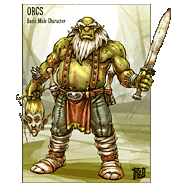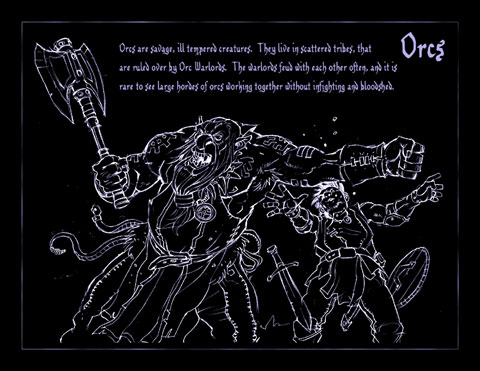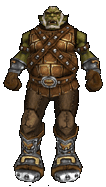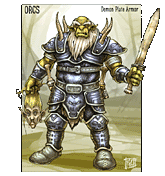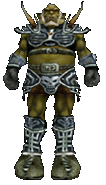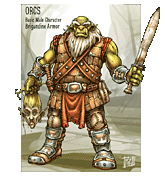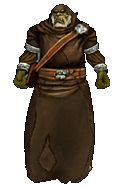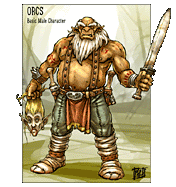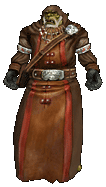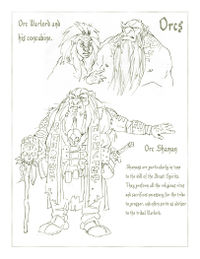Ultima X orcish history
SOURCE: Official Ultima X: Odyssey Website - www.uxo.ea.com - December 19, 2003
Copied from UXO Stratics
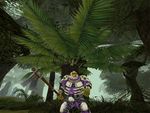
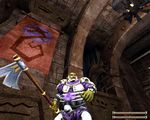
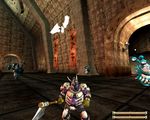
Name: Orc (plural: Orcs)
Disposition: Mercenary cutthroats, but not without a sense of honor
Locale: Orcs surrounded by vast tracts of open land to provide better visibility of possible invaders.
Organization: Orcs live in isolated, fortress-like settlements in easily defended areas.
Physical Description
Strong-minded, strong-bodied, and strong-smelling, orcs are brutal and aggressive creatures. Most orcs stand only a few inches taller than humans, but they can appear to be much larger because their upper bodies are heavily muscled. Orcs take great pride in their physiques, and often train rigorously to increase their size. The skin color of orcs can vary greatly, from a yellowish-brown to a dark green, and their hair is usually worn in radical styles, such as mohawks or top-knots.Perhaps the most noticeable aspect of orc appearance is their lack of hygiene. Bathing is not practiced or even understood among the orcs, and tattered clothes and rusty armor are common. Created by the Guardian to be an army with no upkeep needs, orcs age so slowly as to be almost immortal; if they weren't so avid to engage in battle, each one could live for centuries.
History
"I know what you're thinking.""Get out of my mind. You're not welcome here."
"You brought me here. I'm part of your mind. You know that."
Dreams of daylight filled Alucinor as the sun greeted the rocks, and the grass, and the trees for the very first time. It was a new beginning for the Avatar. He had taken on his alternate self, the Guardian, and he had succeeded in removing the threat from Britannia. As he surveyed the landscape, he couldn't help but feel like a stranger all over again. But this time was different - this was no foreign land, but one of his own design. It was beautiful.
"This isn't the first time one of us has been pulled into a world of the other's making, [[Elemental Titan|Titan]."
"I have no interest in remembering that place. Pagan was a world of evil, and if I hadn't removed you from Britannia, it would have ended up the same. And I thought I told you to leave." The Avatar knew the Guardian wouldn't be dismissed so easily, but he was exhausted, and he wanted to admire Alucinor's first sunrise before it passed.
"I have an advantage this time, you know. I wasn't inside your mind then the way I am now."
The Avatar closed his eyes tightly, wishing he could close his ears, both inside his head and out. The new world existed; it was now time to bring over others who could help him.
A thin smile danced on the Guardian's lips. The elves and humans would be invited to Alucinor; that much he had sensed. Whether they would agree to come was a different matter. Regardless, the Guardian would be prepared.
He would focus on the human threat himself, but he knew he could not neutralize both the humans and the elves without an army. He deliberated on how to best design an army capable of taking out the elves before they had time to settle in Alucinor. He needed a strong race, at least marginally civilized, and proficient in battle.
As he thought back on his memories of Britannia, he lit upon the answer: orcs. They were a warlike race, with a militaristic society. They cared little for material possessions, and would be easily bribed with promises of military power. And best of all, they had reputations for being dull-witted, so would be often underestimated in battle.
There was one issue left to solve. While orc females were known for being equally strong and capable as their male counterparts, they carried the inconvenience of childbirth, which would potentially lessen the effectiveness of the orcish forces. Where there were women, there were children, and where there were children, there was diminished ability to move on a moment's notice. More reliance on medical treatment. More emotional attachment to family. The Guardian had no interest in this; he was creating an army of barbaric fighters, not a civilization of devoted followers.
The Guardian's solution to the threat was a simple one, and quite elegant - he created only males. Of course, this limited reproduction, which meant the Guardian would have to either create a way for orcs to reproduce, or he would have to make enough of them to ensure they would survive at least long enough to eliminate the elves. He chose the latter.
Soon the land of Alucinor was brimming with orcs. It was bliss for them, and for a time, they were happy. They were allowed to fight and pillage as they wished, and they firmly believed the promises the Guardian made them: that once they had fulfilled the Guardian's need, that Alucinor would be theirs, and theirs alone. They were called upon from time to time to carry out military missions, all of which were easy successes. Orcs were nothing if not loyal to their military rank hierarchy, and so the Guardian's will was never questioned.
Orcs of Alucinor, having no concept of family, relied only on military rank to determine hierarchy. While under the control of the Guardian, orc hierarchy was simple, consisting of only two clearly defined ranks: Master and Bearer. The rank of Master was reserved for the Guardian himself, while the second rank, Bearer, was used to refer to the one orc from each settlement designated as the bearer of the Guardian's orders. Additional designations were deemed unnecessary by the Guardian, as all orcs were considered equally dispensable.
They had few allies save the pixies, which the Master had also created, but even that relationship was one of grudging tolerance, rather than any real respect or regard. The orcs were happy, however, that they weren't bothered with delicate or diplomatic missions for the Master; the pixies held that responsibility.
Over time, the orc population began to dwindle, just as the Guardian knew they would. But the Guardian had planned for this; he knew that orcs tended to stay within their immediate societies, rarely leaving their fortress-like towns unless absolutely necessary. Entire orc communities could disappear, and the other orcs would never know. Between the pixies and the orcs, the Guardian's force was strong.
But then something went wrong. The pixies had apparently changed sides, leaving the Guardian with only the brutish orcs to do his bidding - and the orcs were not well-suited for subtlety.
The Avatar sensed a change, recognizing it immediately. The Guardian's confidence was faltering. He smiled. "I have the pixies, and the elves are coming."
"I have the orcs, and they are still plentiful. Somehow you and I always seem to strike a balance."
"Your pixies left you. What makes you think the orcs will not?"
"They won't stray. I created them. They have no families, no women, no children, no distractions. They are completely dedicated to me."
"How will they stay happy?"
"They don't need to be happy. They only need to obey."
But the Guardian knew his position had been weakened. The orcs would never have the finesse to take the place of the pixies in subverting the Avatar's work. There were barely enough orcs left in Alucinor to take out the elves alone - without the pixies to cause havoc behind the scenes, a full frontal attack on the elves would probably mean the end of the orcs. But the elves had to be destroyed immediately; they couldn't be given the chance to settle in Alucinor. It was a sacrifice he would have to make.
The Avatar had tried in the past to talk to the orcs, but they had refused to listen, seeing the Avatar only as the mortal enemy of the Master. The Avatar appeared again, this time to a grizzled orc scout named Morlub. He asked Morlub how long it had been since he had seen the neighboring orc community. As the Avatar suspected, Morlub had never been there. He told him then that the neighboring orc community - that all the neighboring orc communities - were gone, destroyed while carrying out raids ordered by the Guardian. Morlub dismissed the news as an obvious attempt at deception. But the Avatar had chosen Morlub for a reason; he knew that Morlub had been frustrated by the lack of support from their neighbors. Morlub decided, as the Avatar knew he would, to check for himself.
What Morlub found would forever change orc society. The other orcs were gone. Their encampments were not ravaged, or pillaged, or destroyed; they were simply empty. No battle gear was in sight, and everything had been carefully secured. The orcs who lived there had left on their own accord, fully prepared for a battle. Morlub continued onwards to the next orc settlement, and found the same thing. Eventually, he could not deny what the Avatar had told him: his own settlement was the only one left. It was the largest settlement, housing thousands of orcs, but it was alone. He took some personal items belonging to the Bearer of each settlement he visited as proof of his story, and returned home to inform his clan.
His Bearer was dubious, but discovered quickly that it was true. The orcs were not the followers of the Master; they had been merely fodder. Fodder that would soon be extinct.
For the first time, the orcs questioned the promises of the Master. The orcs had been promised ownership of Alucinor, and now it seemed unlikely that their race would even survive. Hundreds of thousands of orcs had given their lives in battle, based on promises for the future. And for what?
They had watched the Guardian turn his back on the female pixies, leaving them to make their own way among the other inhabitants of Alucinor. Even the male pixies, who had remained loyal to the Master till the end, had been horribly twisted and left to live out tortured lives as unrecognizable creatures. Was this to be their fate as well? Or even worse - were they to disappear from Alucinor forever?
The Avatar was pleased; the elves would be coming very soon, and the Guardian would be calling on the orcs to fight them. It was all going to come down to timing.
"What have you done?"
"I have done nothing; your orcs have simply discovered the truth. They've seen that you offer them no future."
"I created them for a specific purpose, and they would have fulfilled that purpose. They didn't need a future."
"I think they disagree."
The Avatar was correct. Despite the fact that the orcs had no families or children to protect, their desire for self-preservation was strong, and they had no interest in following a leader who would watch dispassionately as their race was destroyed, or even worse, who would issue the orders that would see their kind eradicated completely. They cared little for the Avatar or the Virtues, but it was clear that if their kind was to survive in Alucinor, they would need new allies.
The Bearer deliberated on the best course of action, and finally made his decision. They would join the Avatar in his fight against the one who had been their Master. They would no longer be the Guardian's army, to be used and discarded as he saw fit. They would learn the Virtues themselves and use them to weaken the Guardian's hold on Alucinor. It was time for revenge.
Organization
Under the Guardian, there was little need for an organized orc society. The Guardian gave orders, and the orcs carried them out. Battle, however, was a different story. Although it's easy to assume by their barbarous nature that orcs would be chaotic and unmethodical, that was far from the truth.
Partially due to their lack of distinct ranks in orcish society, and partially due to their unquestioning willingness to follow the orders of the Guardian, orcs saw themselves as a single merged unit in battle, and their terminology for the various battle positions reflected that mindset. Those orcs who were brave enough to charge into battle at the forefront were considered to be in the "helm" position. Those who made up the middle of the force were called the "habergeon" of the battalion. Orcs who defended the trunk's vulnerable sides were said to be in the "gauntlet" position. Lastly, the orcs who brought up the rear were considered the "boot" of the force. Orcs did not usually occupy the same position in successive battles; since the helm was invariably the most highly desired location, it was always filled by the first orcs to begin a formation in preparation for battle, whoever those orcs might be.
Once the decision was made to start a new orc society independent of the Guardian, it was clear that a new command structure would be needed. The one surviving Bearer, as the highest (and only) ranking orc in Alucinor, took on as his first task the job of creating new ranks. It was suggested by some that he move into the rank of Master and assign new orcs to become Bearers, but the Bearer decided instead to remove the Guardian's chosen titles from their ranks completely, and adapt a system created by the orcs themselves.
Breakup of an orc clan:
Helm: The highest rank in orcish society. One orc, formerly known as the Bearer, holds this title.
Habergeon: For each orc settlement, there are anywhere from three to six Habergeon serving as the ruling council of that individual settlement.
Gauntlet: Each settlement features anywhere from six to twelve orcs who serve as the Gauntlet. These are extremely aggressive and brutal orcs whose purpose is to ensure that the orcs remain the top fighting force in Alucinor. They will stop at nothing to see that the orcs' reputation as barbaric and savage combatants is a merited one.
Boot: The "enlisted man" of orcish society, consisting of all orcs in non-leadership positions.Most orcs live in permanent militant camps, where there are few rules other than might makes right. Construction of orc living quarters is usually simple and crude, the location being far more important than the appearance. Orcs prefer to create settlements in large open areas, providing no cover for surprise attacks. Visitors would do well to announce their presence early and loudly, as orcs will not hesitate to attack anyone perceived as intruders.
Disposition
One of the factors that made the orcs such a perfect choice in the Guardian's mind for an army was their reputation for being slow and unimaginative. Of course, since these orcs were not brought from Britannia, but rather created by the Guardian, they are far more intelligent than their Britannian counterparts, although this intelligence is usually not apparent by listening to their speech. Orcs believe that the true measure of worth is in actions, not words, leading them to avoid excessive speech and shorten phrases wherever possible.Alertness is of utmost importance to orcs, which means that alcohol is frowned upon for the most part - the exception being during major post-battle celebrations. Having no concept of family, orcs show little in the way of affection for other races, or even other orcs. Respect is earned through battle alone.
For the most part, the orcs have diverged completely from the ways of the Guardian, although there are still signs of the Guardian's influence in the minor details of orcish society, such as in their terms for the time of day:
Bloodwatch: Mid-dark
Firstebb: Before daybreak
Daytide: From daybreak
Threemoons: Mid-light
Lastebb: After mid-light
Eventide: From light's endAlthough since their departure from the Guardian's side, the orcs do follow the Virtues, speculation abounds as to whether or not they do so out of a belief in the Virtues themselves, or out of a pure desire for revenge against the Guardian. There may be few who know for certain, save the orcs themselves.
Attire
Orcs care very little for their appearance, choosing clothing based only on its functionality. If it can stop a spear, it's good armor, regardless of what it looks like.Combat
Most orcs spend their lives training for and engaging in combat, which means that a discussion of orc society is almost by definition a discussion of orcs in combat.
Orcs are proficient with many types of fighting, but generally prefer heavy, hard-hitting weapons that devastate their foes while they're on the offensive, which is usually the entire battle. Despite their bulk, orcs are more nimble than they look.
Although orcs won't generally go out of their way to be fair during the heat of battle, they do have a sense of honor, and will rarely attack an unarmed opponent unless provoked (or unless ordered by a higher ranking orc).
SOURCE: Official Ultima X: Odyssey Website - www.uxo.ea.com - October 2, 2003
Orcs
Strong-minded, strong-bodied, and strong-smelling, orcs are brutal creatures whose aggressive ways are reflected in their society. Most orcs live in permanent militant camps, where there are few rules other than might is right.Orcs are only a few inches taller than humans, but they can appear to be much larger because their upper bodies are heavily muscled. Orcs take great pride in their physiques, and many orcs train rigorously to increase their size. The skin color of orcs can vary greatly, from a yellowish-brown to a dark green, and their hair is usually worn in radical styles like mohawks or top-knots. Perhaps the most obvious aspect of orc appearance is their lack of hygiene. Bathing is not practiced or even understood among the orcs, and tattered clothes and rusty armor are common.
Orc life revolves around combat, and the many disputes that arise in orc settlements are settled not by a justice system but by a fight. He who remains standing at the end of the fight has won the dispute. Understandably, orcs measure one another by their reputation in combat and their abilities on the battlefield. Little emphasis is placed on higher pursuits, and settlements are constructed quickly and simply from locally available materials.
Most orcs spend their lives training for combat. Orcs generally prefer heavy, hard-hitting weapons that devastate their foes while they're on the offensive-usually the entire battle. A warning to those traveling in orc country: some orcs value nothing more than victory, so the only battlefield action they consider dishonorable is losing.
